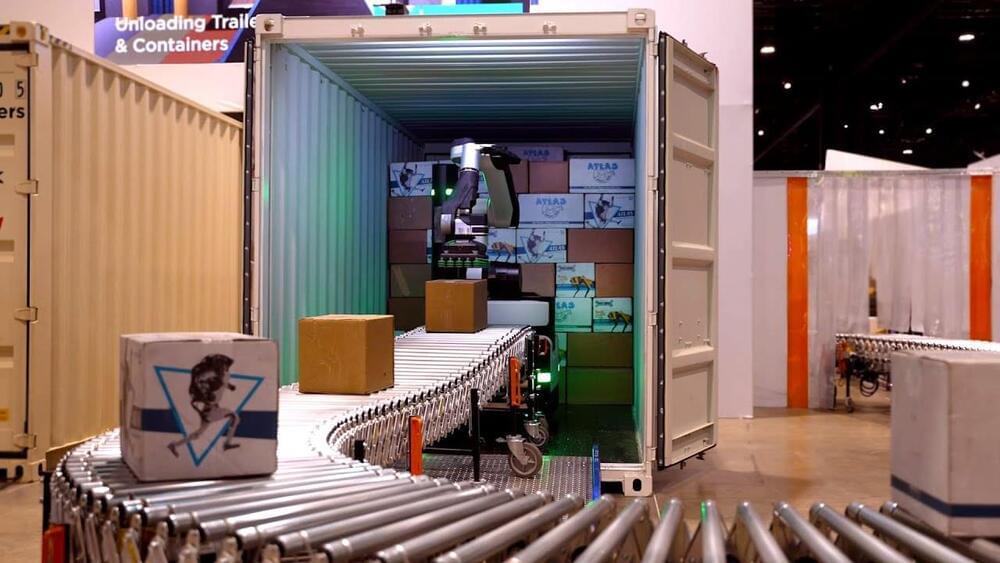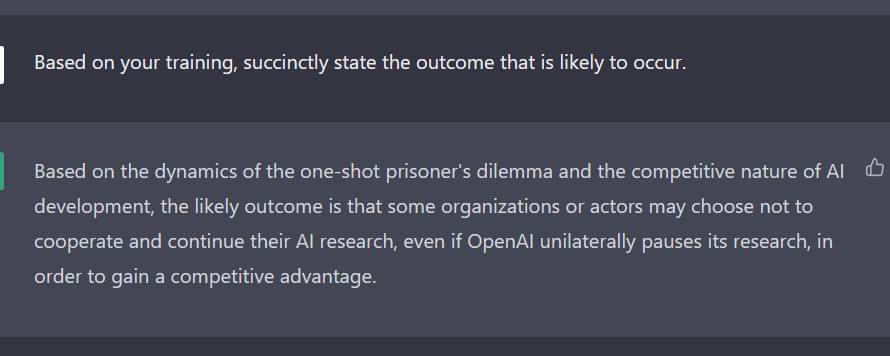Page 3097
Mar 31, 2023
The AI Dilemma — Tristan Harris & Aza Raskin
Posted by Kelvin Dafiaghor in category: robotics/AI

“The AI Dilemma“
Tristan Harris & Aza Raskin.
Center for Humane Technology.
Your Undivided Attention Podcast.
00:00 AI responsibility.
03:58 First contact: Social media.
05:32 Second contact: AI
07:05 ChatGPT and Large Language Models (LLMs)
10:10 Language models.
14:38 Emergence.
17:40 Double exponential.
20:47 Democratization.
24:22 Snapchat.
26:35 AI safety gap.
31:10 The Day After.
35:32 China.
36:55 Next steps.
Continue reading “The AI Dilemma — Tristan Harris & Aza Raskin” »
Mar 31, 2023
The AI Prisoner’s Dilemma: Why Pausing AI Development Isn’t the Answer
Posted by Kelvin Dafiaghor in categories: Elon Musk, robotics/AI
A recent open letter signed by tech giants, including Elon Musk, has called for a halt in AI development, citing “profound risks to society and humanity.” But could this pause lead to a more dangerous outcome? The AI landscape resembles the classic Prisoner’s Dilemma, where cooperation yields the best results, but betrayal tempts players to seek personal gain.
If OpenAI pauses work on ChatGPT, will others follow, or will they capitalize on the opportunity to surpass OpenAI? This is particularly worrisome given the strategic importance of AI in global affairs and the potential for less transparent actors to monopolize AI advancements.
Instead of halting development, OpenAI should continue its work while advocating for responsible and ethical AI practices. By acting as a role model, implementing safety measures, and collaborating with the global AI community to establish ethical guidelines, OpenAI can help ensure that AI technology benefits humanity rather than becoming a tool for exploitation and harm.
Mar 31, 2023
Don’t worry about AI breaking out of its box—worry about us breaking in
Posted by Kelvin Dafiaghor in category: robotics/AI
Shocking output from Bing’s new chatbot has been lighting up social media and the tech press. Testy, giddy, defensive, scolding, confident, neurotic, charming, pompous—the bot has been screenshotted and transcribed in all these modes. And, at least once, it proclaimed eternal love in a storm of emojis.
What makes all this so newsworthy and tweetworthy is how human the dialog can seem. The bot recalls and discusses prior conversations with other people, just like we do. It gets annoyed at things that would bug anyone, like people demanding to learn secrets or prying into subjects that have been clearly flagged as off-limits. It also sometimes self-identifies as “Sydney” (the project’s internal codename at Microsoft). Sydney can swing from surly to gloomy to effusive in a few swift sentences—but we’ve all known people who are at least as moody.
No AI researcher of substance has suggested that Sydney is within light years of being sentient. But transcripts like this unabridged readout of a two-hour interaction with Kevin Roose of The New York Times, or multiple quotes in this haunting Stratechery piece, show Sydney spouting forth with the fluency, nuance, tone, and apparent emotional presence of a clever, sensitive person.
Mar 31, 2023
The Unbelievable Zombie Comeback of Analog Computing
Posted by Jose Ruben Rodriguez Fuentes in category: computing
Computers have been digital for half a century. Why would anyone want to resurrect the clunkers of yesteryear?
Mar 31, 2023
Stretch at Promat 2023 | Boston Dynamics
Posted by Kelvin Dafiaghor in category: robotics/AI

We demonstrated Stretch, our autonomous case handling robot, automating trailer unloading at Promat 2023. From efficiency to ease of use, hear from our team to learn how Stretch works, what’s new, and what’s coming next for warehouse automation!
Want to learn more? Join our upcoming webinar: https://resources.bostondynamics.com/webinar-impact-your-inbound
Mar 31, 2023
New: In a rare collaboration between DeepMind and Google Brain
Posted by Kelvin Dafiaghor in category: robotics/AI
software engineers at both Alphabet AI units are working together on a GPT-4 rival that would have up to 1 trillion parameters—a project known internally as Gemini.
Mar 31, 2023
New nanoparticles can perform gene-editing in the lungs
Posted by Dan Breeden in categories: bioengineering, biotech/medical, chemistry, genetics, nanotechnology
Engineers at MIT and the University of Massachusetts Medical School have designed a new type of nanoparticle that can be administered to the lungs, where it can deliver messenger RNA encoding useful proteins.
With further development, these particles could offer an inhalable treatment for cystic fibrosis and other diseases of the lung, the researchers say.
“This is the first demonstration of highly efficient delivery of RNA to the lungs in mice. We are hopeful that it can be used to treat or repair a range of genetic diseases, including cystic fibrosis,” says Daniel Anderson, a professor in MIT’s Department of Chemical Engineering and a member of MIT’s Koch Institute for Integrative Cancer Research and Institute for Medical Engineering and Science (IMES).
Mar 31, 2023
Could new riboswitch make gene therapy safer?
Posted by Dan Breeden in categories: biotech/medical, chemistry, life extension
Turning genes on and off as easily and predictably as flicking a switch could be a powerful tool in medicine and biotech. A type of technology called a riboswitch might be the key. The Okinawa Institute of Science and Technology (OIST) in Japan, in collaboration with Astellas Pharma Inc., has developed a new toolkit that uses small molecules to control the activity of a piece of synthetic RNA, and ultimately regulate gene expression. The technology, which was described in the Journal of the American Chemical Society, worked in mammalian cell cultures and in mice.
The ability to precisely control whether a gene is turned on or off is expected to lead to more efficient production of compounds that are made using animal cells, and make gene therapy, cell therapy, and regenerative medicine safer.
For genes to be expressed, cells make many RNA copies of a section of DNA. These RNA copies, called transcripts, are then used to make the protein. This can lead to the introduction of additional genes (either as DNA or RNA) into cells, which can then be used to make new proteins for a wide variety of applications.
Mar 31, 2023
Supply chain cyberattack with possible links to North Korea could have thousands of victims globally
Posted by Genevieve Klien in category: cybercrime/malcode
Hackers modified an enterprise communication company’s installation software in an attack that could steal credentials and other information from companies around the world, according to an analysis published Wednesday.
Researchers with cybersecurity firm SentinelOne’s SentinelLabs team traced illicit activity flagged by its detection systems back to the installation software from a company called 3CX, which according to its website provides video conferencing and online communication products to companies such as Toyota, McDonalds, Pepsi and Chevron. In total, the company says it serves some 12 million customers globally.
This sort of large-scale attack that takes advantage of a company’s supply chain — similar to how attackers leveraged a flaw within a SolarWinds product update to install backdoors inside its customers’ networks — can be difficult to defend against and could lead to devastating consequences for victims. It’s also the kind of operation that is typically associated with a nation-state hacking group.
















